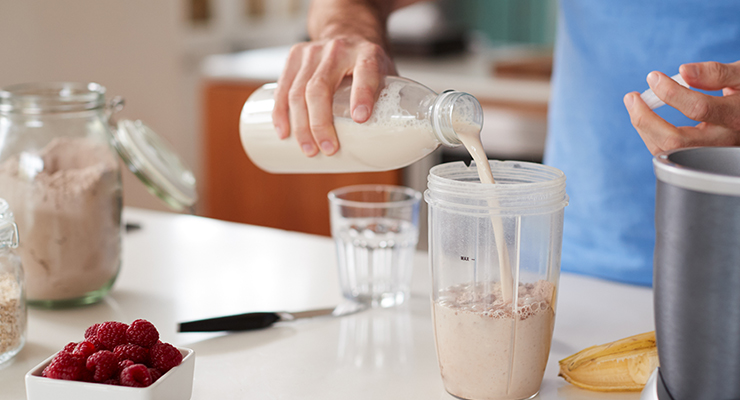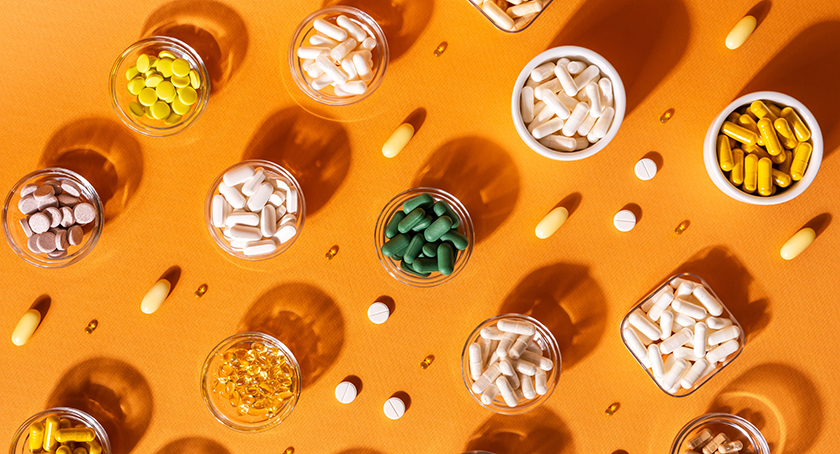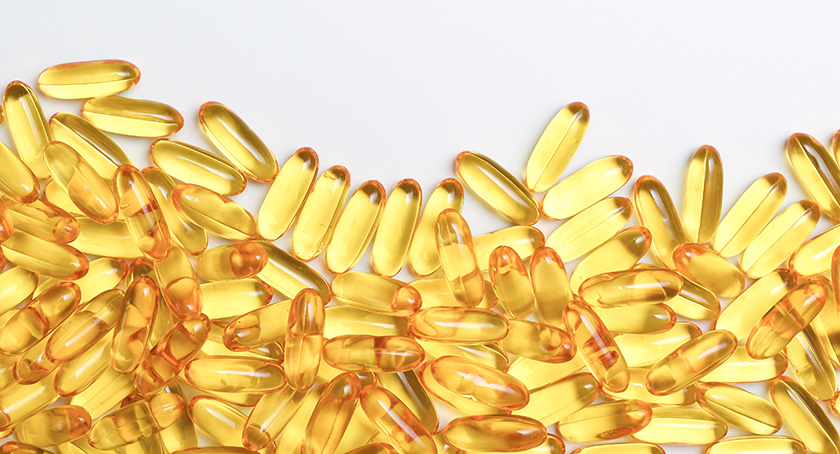Features
Active Lifestyles Lead Health Markets in Fresh Directions
Consumers have a spectrum of needs as they focus on getting fit and staying active.

By: Sean Moloughney

While dedicated athletes and fitness enthusiasts still represent a strong core of the sports nutrition category, consumers who are more broadly committed to active lifestyles now represent substantial opportunities for brands to deliver on a range of mainstream health needs.
“According to Nutrition Business Journal, health-minded consumers who exercise are doing such activities as walking and yoga and have found ways post-lockdown to retain those activities,” said Sam Michini, vice president of marketing and strategy, Deerland Probiotics & Enzymes. “And, in addition, those who turned to connected fitness platforms found that exercising was a way to be social; this new community aspect has kept many sticking to their exercise routines.”
The new consumer in this category, Michini said, “according to NBJ, is looking for ‘active lifestyle’ nutrition, not ‘sports’ nutrition; although ‘sports nutrition’ remains a strong albeit specialized category for athletes, both professional and amateur.”
Market Evolution
As consumer mindsets have changed, the market is becoming more diverse and fragmented, according to Jaume Reguant, healthcare director, Bioiberica. “As people look to take a more proactive, holistic, and long-term approach to their health, the everyday consumer is now incorporating sports nutrition products into their daily regimen as a way to boost energy and better their overall health.”
These shifts have led to an evolution of the active nutrition segment, which now encompasses consumers who want to take a proactive approach to health, but don’t necessarily go to the gym or engage in sporting activities every day. “As such, sport nutrition products are more popular than ever before and there’s a real opportunity for traditional sports nutrition brands to diversify their products and meet the needs of mainstream consumers,” Reguant said.
Amid gym closures, fitness class cancellations, and the suspension of sporting events, sports nutrition sales took a hit in 2020, said Pam Stauffer, global marketing programs manager, Cargill, “with Grandview Market Research reporting a 32.1% decline in revenue from 2019 to 2020. However, as pandemic restrictions eased, the segment rebounded with health and fitness conscious consumers returning to the category, albeit with heightened expectations.”
Active lifestyle consumers today are looking for nutrition products that deliver specific health benefits, Stauffer added. “At the same time, they’re watching carbs and sugar content, and embracing options made with label-friendly, familiar ingredients. All the better if they also carry social or environmental messaging that aligns with consumers’ lifestyles.”
Developing products that can meet all those demands is no easy task, she said, “but for brands who rise to the challenge, there’s a real opportunity to stand out on increasingly crowded shelves.”
Tim Hammond, vice president of sales and marketing, Bergstrom Nutrition, noted a general upswing of attention to overall wellness. “Consumers crave the ability to function at high physical and cognitive levels, while remaining socially engaged and retaining a youthful appearance. We believe health and well-being will continue to be on the forefront of consumer’s priorities and will drive choices that help them improve their ability to age well.”
The COVID-19 pandemic has undoubtedly led to a shift in how consumers regard their health and well-being, said Reguant, “motivating them to make long-term, sustainable lifestyle changes.”
He pointed to FMCG Gurus research which showed 61% of consumers are looking to improve their overall health. “This new approach to health and wellness is one that we expect to have a lasting impact on consumer behavior for years to come,” Reguant said.
Annie Eng, CEO of HP Ingredients (HPI), noted “an interesting and pivotal paradox during 2020 and early 2021.” While confined to their homes, many consumers adopted healthier habits. “The fear that the pandemic has generated has motivated millions to get healthier, incorporating exercise routines and healthier eating with appropriate dietary supplementation to achieve immune resilience and better overall health and well-being. With gyms and fitness centers closed for months, people hopped on bikes, took walks, tuned into apps and virtual classes. For many, we see that moderate exercise they commenced during lockdown has continued. The results they achieved are enough motivation to keep it going.”
Targeting Benefits
Globally, consumers are recognizing that all aspects of health are connected and influence each other. “As a result, they are taking a more holistic approach, increasingly seeking to improve overall well-being, rather than targeting specific health concerns in isolation,” said Reguant. “In fact, a rising number of consumers is making the link between being active, overall health, and quality of life. According to research by FMCG Gurus, over two thirds of global consumers say they recognize a direct link between mobility and overall health.”
Some people are even making a connection between mobility and emotional well-being, he continued. “Linked to this, more consumers are seeking solutions which bring together ingredients that support all mobility-related aspects, like bone, joint, tendon, and muscle health.”
These factors lead to significant opportunity for sports nutrition brands to differentiate themselves in a competitive market, Reguant said. “For instance, communicating the benefits of good mobility on overall health and well-being could help make such products relevant to a new generation of consumers seeking products for sustainable health. In addition, taking a more integrated approach to formulations by considering movement as a whole and integrating innovative ingredient combinations that provide a variety of benefits could make all the difference.”

Professional athletes and active consumers alike are more proactive than ever when it comes to their overall wellness, which includes both performance and recovery, said Hammond. “However, training and strenuous activity place such a demand on muscles that healthy joints, and mobility are essential for pursuit of active well-being. As a result, supplements have become a significant part of many fitness enthusiasts’ daily routines to help promote recovery and reduce soreness while allowing muscles to adapt to stress.”
Active lifestyle consumers are looking for products that help them workout better, longer, and keep them mentally fit,” said Elyse Lovett, vice president of marketing, Nutrition21. “More serious athletes are looking for products that offer them an edge, that keep them physically and mentally sharp when facing stiff competition. Both sets of consumers, however, want products that work quickly and offer benefits like strength, power, energy, focus, and recovery.”
According to Michini, in the active nutrition market, “the overarching theme is to whittle away fat while simultaneously building muscle and endurance. For the market of sports enthusiasts and athletes, the goal is to optimize performance of strength and/or endurance. The difference between the two markets is intensity of the goals.”
However, there are health needs and market demands that overlap, including better protein utilization and microbiome support, Michini said.
Understandably, ensuring optimal immune system function has become a priority among all types of consumers, “and this consciousness is likely going to be long-term,” Michini said. “For both the active nutrition and sports performance enhancement consumers, supporting immune function will be tightly interwoven into their regimens. Athletes, for example, are keenly aware that intense workouts and competition can stress immune function.”
In Hammond’s view, sports nutrition is a broad category that should meet all the demands of an active lifestyle—independent of age or activity. “Our efforts consider the entire process; therefore, we conduct research on healthy populations with measurable outcomes. We then examine how that information can benefit a wide range of end-users, from those desiring to remain active and mentally sharp as they grow older to recreational and competitive athletes wanting to improve and maintain their fitness levels.”
Meeting Demands
Efficacy, safety, and delivery are important attributes for any sports nutrition product, according to Lovett. “Consumers want to make sure the products work safely and have research-backed ingredients with substantiated benefit claims. For many, this translates to offerings that are stimulant-free and have the same impact as their caffeine-laden counterparts. Nutrition21’s Nitrosigine and nooLVL products offer non-stimulant performance benefits in pre-workout and e-sports formulations, respectively.”
Consumers are also becoming more demanding when it comes to delivery, she added. “They desire products that fit seamlessly into their fitness and training routines. Supplements need to deliver ingredients fast and feature interesting as well as palatable flavors.”
Reguant also noted that consumers are researching quality, efficacious products and ingredients to support their health goals, “with the majority of people looking for products with ingredients they recognize. At the same time, better-informed consumers look for specific trademarked ingredients they have found through research or seek products from companies they trust.”
Consumer purchasing is strongly influenced by science-backed claims, he added. “In fact, over half of consumers globally say that science-backed ingredients are important to them when deciding to purchase a product. Since they prefer ingredients that are scientifically validated for their health and fitness needs, and therefore safe and effective, this means they are more likely to look for scientific evidence that supports the ingredient claim before buying.”
Consumers have had plenty of time during the pandemic to re-think and re-evaluate what they expect from nutrition products, according to Stauffer. “Product developers are responding, which is why we’re seeing a flush of new products that go beyond protein to deliver additional benefits, from immune support to stress relief to sustained energy.”
Eng noted the rapidly growing market for e-sports/gaming, “which is highly competitive and requires tremendous energy and agility.” For a mental edge in competitive e-sports, she said HPI’s IQ200 Kesum (Persicaria minor and Polygonum minus) “may help support intellectual performance and memory (function more than structure). Two human studies have shown that IQ200 exerted significant improvements in Cognitive Function Score in reaction time, working memory, and sustained attention as well as on Digit Span test, short-term memory, and Wechsler Abbreviated Scale of Intelligence score. Clinical studies show improvements in cognitive flexibility, processing speed, and executive function in adults. Subsequent studies demonstrated improvements in working memory and brain-derived neurotrophic factor (BDNF).”

Innovation & Formulation
Brand marketers continue to innovate around protein, said Lovett, “which is one of the most well-studied and effective ingredients in the sports performance space. Nutrition21’s ingredient Velositol, a patented complex of amylopectin and chromium is designed to work as protein’s perfect partner. Velositol, when used with whey protein, plant protein, or branched chain amino acids, significantly amplifies their impact on muscle protein synthesis.”
Nutrition21’s most recent clinical study on Velositol showed that when delivered with 15 grams of whey protein, Velositol improved strength, enhanced jumping power, and increased muscle endurance.
Meanwhile, the company’s nooLVL is a patented complex of bonded arginine silicate with an additional optimized dose of inositol, Lovett noted. “It is a non-stimulant nootropic ingredient that enhances cognitive performance in fast-paced e-sports competitions. nooLVL has been clinically studied in gamers and has shown to increase energy within 15 minutes, as well as increase focus, reaction time, and accuracy.”
Most recently, nooLVL was studied in gamers to examine its effects prior to and following a 1-hour gaming challenge. Cognitive benefits included enhanced reaction time, reasoning, and concentration. “This new data adds another layer of substantiation to nooLVL’s clinically studied benefits,” said Lovett.
Protein remains a huge draw in the sports nutrition space, noted Vince Cavallini, beverage, snacks and cereals applications manager, Cargill, “as consumers associate the nutrient with a raft of positives, including muscle-building, weight management, satiety, and recovery speed. Certainly, soy and whey proteins remain widely popular in formulations, but alternative plant-based proteins are also gaining ground.”
Pea protein, in particular, is well-suited for sports nutrition applications, he added. “PURIS pea protein delivers 80% protein with a high protein digestibility-corrected amino acid score (PDCAAS). In addition, pea protein is high in branched-chain amino acids like leucine, the type of amino acids used to build muscle and provide energy.”
While pea protein contains all the essential amino acids, it is not a complete protein, said Cavallini, because methionine and cysteine are present in relatively low amounts. “To compensate, formulators can blend pea protein with a complementary protein source to make complete protein claims. Another option is to add extra pea protein to hit the target protein claim.”
Deerland’s ProHydrolase is an enzyme that targets protein, breaking its larger peptides down into smaller ones, thereby increasing the available amino acids in the blood, said Michini. “One human study showed a 20% increase in total amino acids in the blood at a dose of 10 mg ProHydrolase per 1 gram of whey. Another benefit shown by one of our two human clinical and in vitro studies show that it also reduces C-reactive protein (CRP) levels, a sign of inflammation. Inflammation is often a byproduct of intense workouts or competition.”
Bacillus subtilis DE111 is Deerland’s unique spore-forming probiotic strain supported by clinical research specific to exercise and fitness benefits, said Michini. “In one study of collegiate women DE111 produced statistically significantly improvements in the reduction of body fat percentage, and a strong trend indicating improved performance of the deadlift exercise. In another study, this one on collegiate men, DE111 was found to help reduce pro-inflammatory TNF-a concentrations, indicating support for exercise recovery.”
In terms of formulation, Michini said powders will remain essential for active individuals. “The innovation lies in not so much the delivery system but in the power of the ingredients and the flavor/texture.”
Additionally, the status of one’s microbiome/microbiota will become more important to the health-conscious and competitive athletes, Michini suggested, “giving probiotics, prebiotics, and synbiotics a long-term growth outcome.”
While some sports nutrition ingredients need to be consumed chronically before significant benefits are experienced, researchers found that one 400 mg dose of TSI Group’s PEAK ATP significantly improves exercise performance 30 minutes after intake. “For consumers to feel the differences after a single dose, and during the first set, is a substantial brand benefit,” said TSI Group President Larry Kolb.
PEAK ATP is a non-stimulant energy source that fuels muscles and powers the body’s movement. ATP is the body’s preferred energy source as it drives the biological reactions that allow cells to function and life to exist.
This randomized, placebo-controlled crossover study was designed to establish the minimum effective dose of ATP to increase performance. Researchers at Brazil’s Federal University of Piauí evaluated the benefits of 100 mg, 200 mg, and 400 mg dosages of PEAK ATP, administered orally as a premix powder. Participants were 20 recreationally trained men in their late 20s who completed four sets of resistance training exercise until movement failure, with two minutes of rest between sets.
“These results confirm the immediate benefits of PEAK ATP for athletes, weekend warriors, and everyday exercisers,” said Kolb. “We feel that there is a huge advantage for consumers who are able to feel the performance benefit from the first use onward, instead of waiting for weeks for supplementation to take full effect. PEAK ATP helps exercisers to push harder during high-intensity and/or exhaustive exercise. And because PEAK ATP supports increased work volume, it can help anyone make the most of time spent exercising.”
Cargill sees opportunities for products with additional health- or performance-supportive ingredients beyond protein. “The market research firm Packaged Facts suggests that consumers are especially receptive to ingredients they perceive as immune supportive,” said Cashtyn Lovan, marketing manager, Cargill Health Technologies. “Formulators looking to address this growing opportunity should consider a new group of postbiotic ingredients, which are starting to catch consumers’ eye. In the sports nutrition space, where products typically aim for health-oriented positioning, it’s especially important that these claims be backed by science.”
EpiCor postbiotic has been clinically shown to support the immune system and positively modulate the gut microbiota, said Lovan. “Backed by over 75 years of fermentation expertise, EpiCor is made through a natural, proprietary process that creates a unique fingerprint of metabolites. More than a dozen published studies support its health benefits.”
Given the popularity of keto diets and concern around sugar, sports nutrition products formulated with reduced-sugar levels represent another opportunity. “Further complicating the formulation picture, there’s a move toward cleaner, simpler labels and away from ingredients like artificial sweeteners,” said Cavallini.
At the same time, consumers are unwilling to compromise on taste, he added. “To be successful, brands must balance both desires. Advances around high intensity, plant-sourced sweeteners offer the best pathway forward.”
Cargill’s EverSweet stevia sweetener is based on two of the best-tasting components of the stevia leaf: Reb M and Reb D, said Cavallini. “While these glycosides are rare in the stevia plant, we produce them via fermentation, creating a cost-efficient, great-tasting sweetener, produced with the environment in mind.”
Shared knowledge and partnerships are crucial to innovate in the sports nutrition space, according to Reguant, especially when it comes to combining complex ingredients in a single formulation. “Science-backed ingredients from a partner you can trust, technical and analytical support, as well as market and regulatory knowledge, are all key ingredients for success in today’s landscape.”
With that in mind, Reguant said he’s seeing new developments come to fruition, including multi-nutrient products that support increased functionality. “Proprietary blends including next generation ingredients like native type II collagen (40 mg/day dosage) and hyaluronic acid matrix (80 mg/day dosage), alongside well-known and established ingredients like glucosamine, chondroitin sulfate, and Boswellia are leading the way. For instance, Fisico’s Arthrozene incorporates Bioiberica’s native type II collagen, Mobilee hyaluronic acid matrix ingredient and ApresFlex Boswellia serrata, supporting claims such as ‘supports joint health’ and ‘promotes joint flexibility.’”
Consumers in the sports/active lifestyle market typically seek to not only protect muscles and joints from wear and tear, but also mitigate pain and damage so they can return to activities, said Hammond.
“To that end, OptiMSM (methylsulfonylmethane) provides nutritional support for mobility by keeping joints and connective tissue healthy. It also enhances recovery by accelerating muscle repair and mitigating pain, muscle damage, and soreness following intense training. Plus, MSM bolsters the immune system by supporting redox capacity and mitigating inflammatory cytokines. Ultimately, using the OptiMSM supplement extends the time individuals can be active, empowers them to quickly return to training, and enhances their ability to remain active throughout their lifetime.”
According to Eng, cardiometabolic health, mental energy, immune support, and gains in strength and endurance are all benefits that fitness consumers seek.
“LJ100 is the premier Tongkat ali ingredient for male and female fitness,” she said. One study of 45 men showed those who consumed 200 mg LJ100 while fitness training exhibited 17% improvement in the isokinetic peak torque of knee flexion compared to placebo or training-only.”
Another randomized, double-blind, placebo-controlled study gave 105 men aged 50-70 either LJ100 100 mg, 200 mg, or placebo daily for 12 weeks. At the end of week 12, there was a significant increase in the total testosterone levels in the 100 mg group and at weeks 4, 8, and 12 in the 200 mg group compared to placebo. Cortisol levels significantly decreased in the 200 mg group, while muscle strength significantly increased in both groups at week 12.
Sean Moloughney has been the Editor of Nutraceuticals World since 2012. He can be reached at SMoloughney@RodmanMedia.com.




















